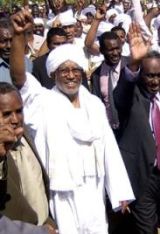Ruling party, political gourps ink charter on Sudan’s future
By MOHAMED OSMAN, Associated Press Writer
KHARTOUM, Sudan, Feb 22, 2005 (AP) — Sudan’s ruling party and 23 other political organizations have signed a charter outlining a common vision for the African country’s future, state-run media reported Tuesday.

|
|
Secretary General of the ruling National Congress party, Abrahim Ahmed Omer, in Sudanese national costume, walks with Sudanese First Vice President Ali Osman Taha (R), in Khartoum, Saturday, Jan. 1, 2005. After the peace accord concluded with the Southern rebellion, Sudanese regime looking towards the preservation of the Islamic orientations of the country. (AP). |
But several leading opposition groups, including the main southern rebel group that fought government forces for 21 years before signing a Jan. 9 peace treaty, did not sign the document.
The charter, which was signed Monday in Khartoum by 24 groups including the ruling Islamic-oriented National Congress party of Sudanese President Omar el-Bashir, was open to all political organizations and comes amid an expected political reform in Sudan following the treaty’s signing.
It calls for preserving Sudan’s identity, religious values and customs and promoting political, social and economic reform, according to state-run television and the daily Al Anba newspaper.
Sudan’s north is predominantly Islamic but those in the south are a mix of Christian, Muslim and animist beliefs.
It is also seen as an attempt to rally more Sudanese political groups around el-Bashir’s party ahead of the expected increase of influence of the Sudan People’s Liberation Movement. The southern rebel group has risen in prominence since the government made peace with it and is expected to command 30 percent of the seats in a future government.
“This (the charter) is a great step that could lead to, maybe one day, fusion (of the signatories into one political party),” said National Congress party secretary Ibrahim Ahmed Omar following the ceremony at his party’s Khartoum headquarters.
Most signatories already belong to the coalition led by el-Bashir’s party.
But an opposition group criticized the charter as a power grab by the ruling party.
“(The charter was) nothing but an attempt to reinforce the rule of the one party system and an attempt to give it popular backing, which those parties lack,” said Amina Dhirar, of the Beja Congress party. She also criticized the charter’s signatories as “puppets of the government.”
Beja Congress members staged a Feb. 9 rally in Port Sudan that was fired on by police, killing at least 14 people.
Aside from the SPLM and the Beja Congress, the powerful opposition Umma party of former prime minister Sadiq el-Mahdi, who was toppled in a 1989 coup led by el-Bashir, also did not sign the charter.
The charter commits signatories to promoting peace and unity by supporting the southern peace treaty’s implementation, which among other measures makes SPLA leader John Garang a first vice president.
The peace deal, which is legally binding on all sides, also clears the way for the drafting of a new constitution. In six years, southern states will have an opportunity to vote on secession.
Recent political developments, particularly the peace deal that ended a war that killed more than 2 million people and devastated southern Sudan, have raised hopes that a similar solution can be found to end the two-year-long Darfur conflict.
Since Sudan won independence in 1956 from Britain and Egypt, Arab Muslims, who dominate the north, have led the government, which has fought the rebels, who want greater autonomy and a greater share of the country’s wealth in the mainly black animist and Christian south.
